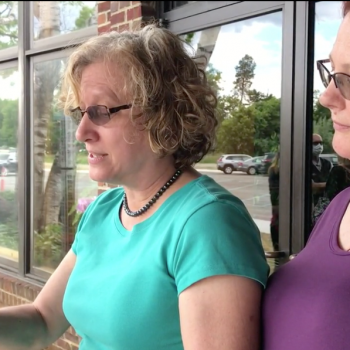Humanist weddings — officiated by non-pastors yet carrying all the appropriate legal weight — have been legal in Scotland since 2005. And now, according to new data from the National Records of Scotland, Humanist weddings are more popular than Christian ones.
In 2019, there were 5,879 Humanist weddings, constituting 23% of all marriages. There were 5,812 Christian weddings (including the Church of Scotland and the Roman Catholic Church), making up 22% of the overall number.
By way of comparison, in 2018, there were 6,117 Humanist weddings, but 6,258 Christian ones.
Keep in mind that a 2017 survey found that an astonishing 72.4% of Scottish people said they were not religious. People are discovering ways to celebrate life, find inspiration, and enjoy community outside the confines of faith, and they’re far better off without religious dogma infesting their minds.
Even for weddings, the trend is clearly moving away from organized religion.

Humanists UK is celebrating the news and calling for England and Wales to join Scotland, Ireland, Northern Ireland, and the Channel Islands in recognizing Humanist weddings.
In England and Wales, over 1,000 couples a year already have a humanist wedding without legal recognition. They all must have a separate civil marriage – usually at a registrar’s office – for their marriage to be legally recognised, even though it is not what they want. Couples must go through formalities twice, leading to financial strain, and distress over the state failing to recognise their humanist wedding as their ‘real’ one.
…
Humanists UK Chief Executive Andrew Copson commented: ‘The huge popularity of humanist marriages in Scotland shows just how many people want to have them when they are legally recognised. The fact that they are not legally recognised in England and Wales is a growing travesty.
‘There has never been a more pressing need for this reform than now, with couples having to delay their humanist weddings simply because there are no civil registrars available in their area for some time. Given the significant and growing backlog of registrar bookings, the UK Government should seek to unclog the system by bringing about legal recognition. This would mean that those couples who want a humanist wedding ceremony would not have to also have an unwanted civil marriage ceremony in order to be married in the eyes of the law.’
This is one of those issues that shouldn’t be controversial at all. By giving Humanist celebrants the same legal power as pastors who officiate weddings, no one is hurt. The only reason for not doing so is an outdated desire to uphold tradition. But not all traditions should be preserved.
In the United States, by the way, it’s a state-by-state issue. Some states allow Humanist/secular celebrants to officiate weddings that “count,” while others limit it only to traditional religious leaders. The Center for Inquiry has successfully sued to change that in Indiana, Illinois, and Michigan. A lawsuit is ongoing in Texas. In 2017, Oregon fixed the problem legislatively.
(Image via Shutterstock. Portions of this article were published earlier)




It’s Moving Day for the Friendly ..."
It’s Moving Day for the Friendly ..."
It’s Moving Day for the Friendly ..."
It’s Moving Day for the Friendly ..."